When I Knew
by Robert Trachtenberg
[Book]
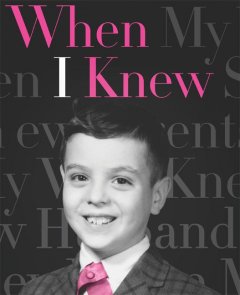
view/request
These stories of queer moments, crushes, fantasies, and coming out will make you smile, cringe, and maybe even tear up. Trachtenberg arranges the stories to oscillate between the quippy and the emotionally charged and highlights something amusing from each story with a provocative illustration. Although I thoroughly enjoyed this book, I would have loved seeing a broader representation of queerness and more stories from POC. Check out more of our LGBT Teen staff picks!
Reviewed by Bridget
Tagged: Coming out, Humor, LGBTQ, Non-fiction
Don’t Explain: A Song of Billie Holiday
[Book]
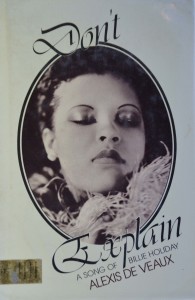
view/request
This book is written as a prose poem that the tells the story of American jazz singer, Billie Holiday’s life. De Veaux writes,
“It was 1935.
American was in between wars.
Harlem was between jobs and riots.
Billie was between 20 and stardom.”
Reviewed by Bridget
Tagged: Billie Holiday, Biography, Jazz, Non-fiction
Chuck Close: Face Book
[Book]
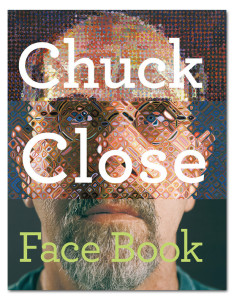
view/request
Chuck Close created this beautiful autobiography complete with pages of mix and match self-portraits and a glossary of art terms. Close realized his love of art when he was very young. As a result of severe dyslexia, Close was labeled “dumb” and he also had a neuromuscular condition which prevented him from being physically active. The talented Close admits dedication to art saved his life. In this book Close talks about his process for creating his massive paintings and prints. To young artists Close says, “ease is the enemy of the artist. Go ahead and get yourself into trouble”
Reviewed by Bridget
Tagged: Art, Autobiography, Faces, Non-fiction, Portraits
Show Me the Magic
by Paul Mazursky
[Book]
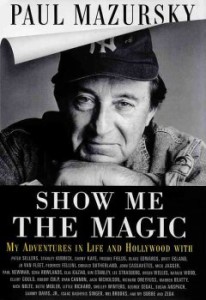
view/request
riter/director/producer/actor Paul Mazursky’s autobiography is an anecdotal collection of Hollywood tales, international adventures and reflections on growing up in Brooklyn. A real page turner, too! I ignored those around me and read this cover to cover in two evenings. Mazursky, who directed classics such as Bob and Carol and Ted and Alice, Blume in Love, Tempest, Moscow on the Hudson and An Unmarried Woman, has plenty of interesting tales to share.
The author recalls showbiz run-ins with Stanley Kubrick (Mazursky’s first major acting role was in Kubrick’s Fear and Desire), Orson Welles, Peter Sellers, George Segal, John Cassavetes, Gena Rowlands, Warren Beatty and Natalie Wood among others. What’s possibly the most fascinating is his relationship with Federico Fellini. It’s a touching friendship and their meeting is something of legend. In addition, Mazursky includes several letters from the great Italian film director in his book.
The title “Show Me the Magic” comes from one of the most exciting pieces of cinema history; a piece of dialog from Mazursky’s adaptation of Shakespeare’s The Tempest. Forever imprinted in my mind is the scene where John Cassavetes conjures up a small miracle… in a film that plays it straight up until that point. An unpredictable moment on screen and perfectly fitting coming the mind of a man who lived an exciting and unpredictable life.
Reviewed by Jason
Tagged: Film, Memoir, Non-fiction
The Big Burn: Teddy Roosevelt and the Fire That Saved America
by Timothy Egan
[Book]
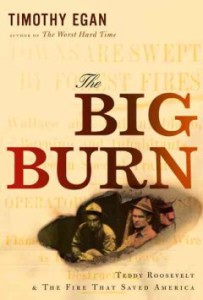
view/request
What does a fire in the Bitterroots have to do with Teddy Roosevelt and the Forest Service? The Forest Service was started by Teddy Roosevelt and Gifford Pinchot, the first chief of the USFS, in 1905. However, many politicians wanted to sell off the forests to large corporations, and thought conservation was a horrible idea. That might sound familiar, but this was at the beginning of the 20th century. A huge fire in 1910 was the catalyst to prevent this new agency from being blown away. Interesting look at the politics of the time, and an adrenaline-inducing account of the front lines of the fire. This book is a coming-of-age story for the United States Forest Service.
Reviewed by Molly
Tagged: History, Non-fiction
The Homemade Pantry
by Alana Chernila
[Book]

view/request
The Homemade Pantry: 101 Foods You Can Stop Buying and Start Making, written by Great Barrington’s Alana Chernila is a practical guide to becoming more self sufficient in the kitchen. The book is cleverly organized by aisle and features staples that many people buy at the grocery store including pasta sauce, jelly, granola bars, and even a homemade version of the beloved Pop-Tart. Every recipe is accompanied by a personal story so if you don’t have a lot of time for cooking you can still enjoy some light reading.
I recently tried the recipe for whole wheat sandwich bread. Bread is one of those things I always really want to make for myself but usually the product is blatantly inferior to the local bakery or even the grocery store version. The instructions had the bread slowly rise in the fridge for up to three days so after nervously waiting, I finally baked my bread yesterday and was delighted to find that it was a success!
If you just can’t get enough of Alana, she also has a blog, Eating From the Ground Up.
Reviewed by Lilly
Tagged: Baking, Cooking, Food, Local author, Non-fiction
Down the Nile: alone in a fisherman’s skiff
by Rosemary Mahoney
[Book]
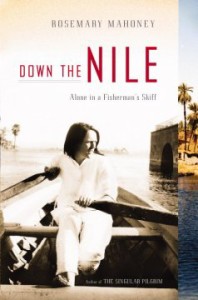
view/request
I liked this independent, determined woman. In the late 1990s, Mahoney, an American writer and experienced recreational rower, got the idea of rowing herself down the Nile. This is not allowed and virtually never done — tourists always travel on cruise boats or feluccas (small sailboats piloted by their owners). When she set out to buy a small rowboat in Egypt, she was met with disbelief. Women, even western women, did not travel alone. To a fisherman, rowing was work, so why would she want to do it herself? Felucca captains and boat owners assumed a woman couldn’t know how to row. Eventually she succeeds in her adventure, and it’s both more and less than expected but always fascinating.
Mahoney is empathetic and eloquent. She engages in conversations with Egyptian men and women she meets, learning a great deal about cultural differences, rampant poverty, and the restricted status of women. She quotes extensively from 19th-century European travelers, notably Florence Nightingale and Gustave Flaubert, and gives a selective history of tourism in the region (including colonialism and theft of artifacts) which puts the present-day in context. So much has changed and so much is the same. In particular, her descriptions of the river and its natural environment — the wildlife, vegetation, water and sky — are poetic and timeless.
Reviewed by Faith
Tagged: Egypt, Non-fiction, Rowing, Travel, Women
All a Novelist Needs: Colm Tóibín on Henry James
by Colm Tóibín
[Book]
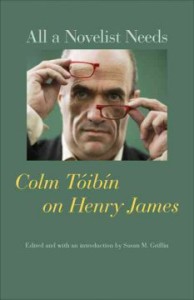
view/request
All a Novelist Needs is beautifully written with fascinating insights into Henry James and his creative process. Anyone who likes Tóibín or James will enjoy this book.
Reviewed by Janet
Tagged: Non-fiction, Writing
The Great Railway Bazaar
by Paul Theroux
[Book]
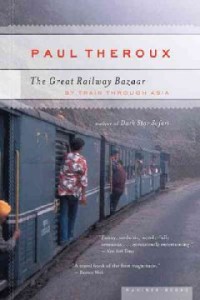
view/request
Have you ever considered traveling from England to Russia via Turkey, Iran, Afghanistan, Pakistan, India, Burma, Thailand, Vietnam, China, and Japan by train? Me either. Paul Theroux does just that and survives to tell about it in his 1975 travel narrative The Great Railway Bazaar: By Train Through Asia. This long journey is broken up into chapters by train, starting with the 15:30 London to Paris and ending with the Trans-Siberian Express. Though Theroux embarks from London on his own, he meets a number of colorful characters and manages to have interesting interactions (usually over a drink) despite linguistic and cultural barriers.
Theroux’s writing style is at times so rich with description that you can practically smell the pungent passenger sitting across from him. In other instances, he is blunt and to the point, relaying only that he is in a particular place to catch a train.The writing style mimics the ups and downs of traveling alone in foreign country and truly makes the reader feel as if they were riding the train alongside the narrator. Though Theroux rarely spends more than a day or two off the train, he manages to convey a surprising amount about each of his destinations through descriptions of the train and characters.
Reviewed by Lilly
Tagged: Non-fiction, Trains, Travel
Midnight in Peking
by Paul French
[Book]
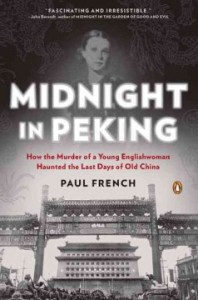
view/request
In 1937 foreigners and native Beijinger’s alike were shocked when the mutilated body of a young woman was found just outside of of Beijing’s Legation Quarter. Clearly, a terrible crime had been committed, but what had happened? The investigation was complicated by the bureaucratic system that made it difficult for law enforcement in the Legation Quarter and in Chinese Beijing to work together and the detectives in charge of the case struggled with a lack of information and communication—and what seemed all too often to be pure obstructionism from above. Paul French’s Midnight in Peking offers a fascinating glimpse of China at beginning of the Second World War, a time when powerful Europeans were leaving China, and many refugees were arriving in Beijing and nearby cities, fleeing from the USSR and Nazi Germany, and from the increasingly hostile and militaristic presence of the Japanese within China.
French’s narrative follows both the official investigations, and the unofficial investigation conducted by the victim’s father. There are some surprising twists along the way, and French takes advantage of them to keep the reader on her toes. An engaging read, but not for the squeamish or those who prefer to read stories in which justice is fulfilled.
Reviewed by Ben
Tagged: China, History, Non-fiction, True crime
How To Sharpen Pencils
by David Rees
[Book]
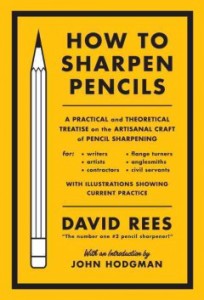
view/request
Humorist/artisanal pencil sharpener David Rees carefully guides us through the various #2 sharpening techniques and the history of the famed utilitarian instrument. The book, half manual/ half comedic piece, is both instructional and hilarious. Rees provides information on setting up a pencil sharpening workshop, pre-sharpening stretches, fancy pencil sharpening routines and of course, sharpening styles and techniques.
Note: this volume is not recommended for fans of mechanical pencils or electric sharpeners!
Reviewed by Jason
Tagged: Humor, Non-fiction, Pencils
The Professor and the Madman: a Tale of murder, insanity, and the Making of the Oxford English Dictionary
by Simon Winchester
[Book]
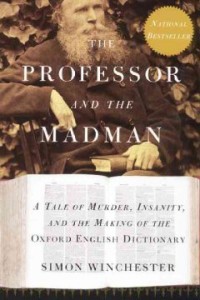
view/request
The creation of the Oxford English Dictionary containing 414,825 definitions was begun in 1857 and took 70 years to complete. The first edition of the OED was given to President Coolidge and is in the Calvin Coolidge Presidential Library & Museum at Forbes Library. The “Professor” is James Murray, a former schoolmaster and bank clerk, and the editor and leader of the OED project. The “madman” is Dr. W. C. Minor, a retired American Civil War surgeon who was the largest contributor with over 10,000 entries to the OED project.Minor was an extraordinary contributor but he was also a murderer, clinically insane, and incarcerated in Broadmoor, England’s asylum for criminal lunatics. Winchester tells the history of the dictionary as well as the biographies of Murray and Minor. While parts are long-winded, the story of the dictionary appeals to those who love words, books and libraries. The biography of Minor appeals to those interested in the mind, behavior and psychology. Readers who enjoy psychological fiction and are looking for a non-fiction bookmight also enjoy this.
Reviewed by Julie
Tagged: Biography, Dictionaries, Non-fiction, Psychology












